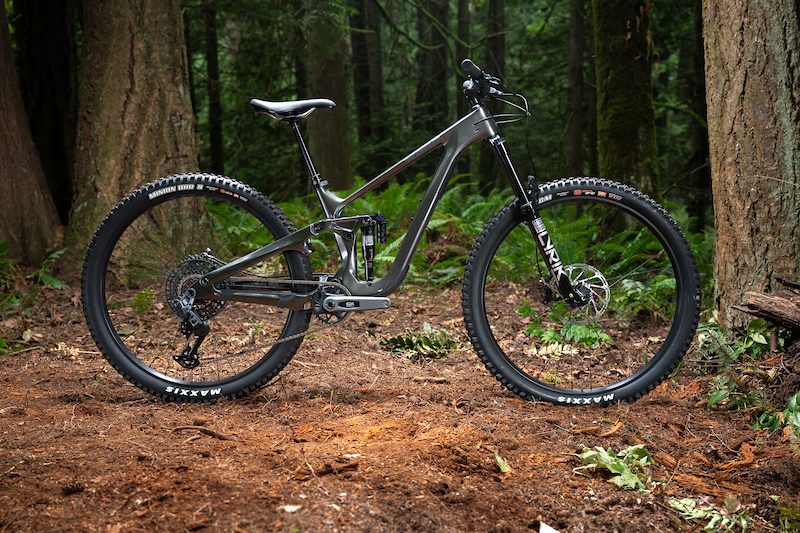The new bikes are the third generation of the Kona Process – the first was released a decade ago. Changes over previous versions include tweaked geometry, with a longer reach and slacker head angles, flip chips that allow you to switch between two 29” wheels or a mullet setup, shorter seat tubes with a deeper seatpost insert to fit longer-travel dropper posts, revised suspension kinematics, and a UDH hanger.
Each model (the 134 and 153) is available with a carbon or aluminum frame, with two build kits for each material.
• Process 134: 134mm rear travel, 140mm fork
• Process 153: 153mm rear travel, 160mm fork
• Alloy or carbon frames
• 29″ wheels or mullet via flip chip
• Head angle: 65.5° (134) / 64.5 (153)
• 435mm chainstays
• Sizes: S, M, L, XL
• Price: $1899 – $5499 USD
• konaworld.com
Definitely worth seeing.
Frame details
Carbon frames feature fully internal cable routing, with a Y-connector to make it easier to route the rear brake line on either side of the head tube. Meanwhile, alloy frames have fully external routing (except for the dropper post) for easier home maintenance.
There’s an accessory mount under the down tube plus room for a full-size water bottle. Frame protection has been improved and Kona use the same widely available pivot bearings in their Process range to make it easier to source spares.
There aren’t specific numbers for seatpost insertion depth, but sizes L and XL come with 200mm posts, and sizes M and S come with 175mm. Kona says some aftermarket 240mm posts will fit sizes XL and L.
Delay
As expected, Kona sticks with their linkage-driven single-pivot suspension layout. This is sometimes referred to as a “faux-bar” because it looks like a Horst-link four-bar, but the rear axle is connected directly to the main pivot.
The leverage ratio has been adjusted to provide 16% progression through the stroke (in the case of the 153 with 29″ wheels), which should be just enough to work well with coil shocks, but probably better suited to air (all models come with air shocks). Anti-squat is quite generous, but not excessive, so it should behave neutrally while pedaling.
The leverage and suspension travel are slightly greater on a 27.5″ rear wheel than on a 29″ rear wheel (which is often the case). This may require a slightly different shock setup.
Geometry
While the reach figures have increased and the head angles have been slackened, Kona hasn’t done anything too crazy with the Process’ shape. Chainstays remain 435mm across the size range, and neither model features the chainstay-length adjustment you’ll find on the Kona Process X.
The seat tube angles aren’t exactly steep, and slacken slightly as you go up in size. In recent years, we’ve seen more brands move to steeper seat tubes for taller riders to compensate for the more rearward weight distribution they otherwise experience.
Builds
Shock: RockShox Super Deluxe Ultimate
Fork: RockShox Lyrik Ultimate RC2
Drivetrain: SRAM GX Eagle transmission
Brakes: SRAM G2 RSC
Shock: Fox Float X Performance Elite
Fork: Fox 36 Performance
Drivetrain: SRAM GX-Eagle
Brakes: SRAM G2 R
Shock absorber: RockShox Super Deluxe Select Plus
Fork: RockShox Lyrik Select RC
Drivetrain: SRAM GX/NX-Eagle
Brakes: SRAM G2 RS
Shock absorber: RockShox Deluxe Select Plus
Fork: RockShox Yari RC
Drive: Microshift Advent X 11-48t 10spd
Brakes: SRAM DB8
Shock: RockShox Super Deluxe Ultimate
Fork: RockShox Pike Ultimate RC2
Drivetrain: SRAM GX/X01-Eagle
Brakes: SRAM G2 RSC
Shock: Fox Float X Performance Elite
Fork: Fox Float 34 Performance
Drivetrain: SRAM GX/NX-Eagle
Brakes: SRAM G2 R
Shock: RockShox Deluxe Ultimate
Fork: RockShox Pike Select RC
Drivetrain: SRAM GX/NX Eagle
Brakes: SRAM G2 RS
Shock absorber: RockShox Deluxe Select
Fork: RockShox Recon RL
Drive: Microshift Advent X 11-48t 10spd
Brakes: SRAM level
